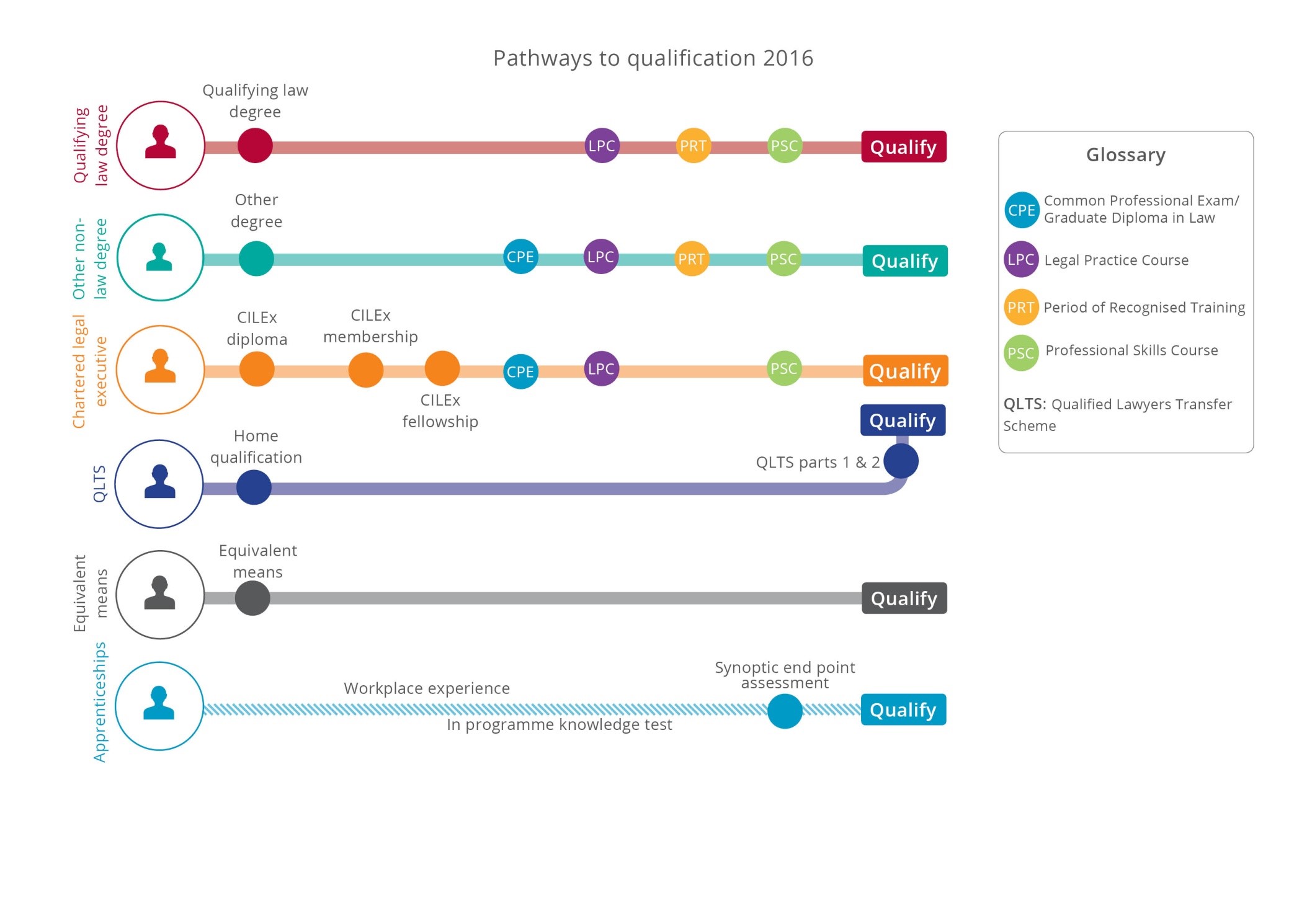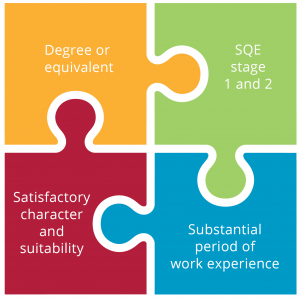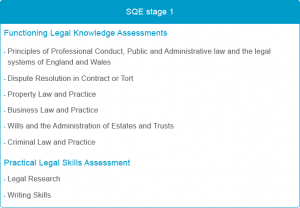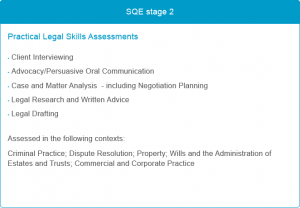In April 2017, the SRA announced that it would be introducing a new national licensing exam for those wishing to be admitted as solicitors of England and Wales, the Solicitors Qualifying Examination, or the SQE.
Where did this idea come from? And why is reform necessary?
What is the current system for qualification as a solicitor of England and Wales?
To understand the case for change, it is important to know how solicitors qualify at the moment.
The diagram below sets out the current routes to qualification. There are lots of them! The most common route requires individuals to take either a Qualifying Law Degree (QLD) or a one-year post-graduate conversion course (the Common Professional Examination/Graduate Diploma in Law (GDL)), followed by the Legal Practice Course (LPC) and then a two-year period of recognised training (or training contract). We authorise education and training providers, and specify course requirements. But each university offering these qualifications sets and marks its own assessments.
The Legal Education and Training Review
The genesis for our educational reform programme can be traced to the independent review of professional legal education in England and Wales, conducted between 2011–2013, the Legal Education and Training Review (LETR). [i] This was commissioned jointly by the SRA, the Bar Standards Board and the regulatory arm of the Chartered Institute of Legal Executives.
The background to LETR was that no review of legal education and training had taken place for many years. During that period, the regulatory framework, the markets for legal services and the market for legal education had all changed. LETR aimed to evaluate whether the legal education and training system was still fit for purpose, and whether it supported the regulatory objectives set out in the Legal Services Act 2007.[ii]
The independent research team carried out a detailed literature review, and interviewed a wide range of stakeholders. They concluded that the primary focus of legal regulators was on regulating pathways to qualification, rather than on assuring standards. They pointed out that we specify these pathways in detail, while permitting a large number of organisations to train and assess would-be solicitors, including universities who provide education and vocational training, and employers who provide work experience and on-the-job training. The current regulatory regime includes an elaborate system for approving and monitoring the provision of education and training by these organisations. But because it regulates inputs, such a system cannot directly assure consistent standards of competence among qualifying and practising solicitors. Worse still, it creates rigidity and barriers (particularly around cost and access to training contracts) which risks preventing talented candidates from being able to qualify.
The SRA’s response to the LETR: Training for Tomorrow
Our response to LETR was to initiate a fundamental programme of review and reform: Training for Tomorrow.
A review of professional standards allowed us to develop a new Competence Statement for solicitors, which for the first time set out the skills and knowledge required for practice as a solicitor. The next step was to consider how best to ensure that, on admission, solicitors had the required skills and knowledge. We proposed a new, rigorous, national assessment, the SQE, to assess all candidates on a fair and consistent basis. We also proposed permitting candidates to prepare for the SQE in the ways which suited them best, rather than continuing to require specific pathways to be followed. And in April 2017, the SRA board announced it would be moving ahead to introduce the SQE, aiming for implementation in Autumn 2020.
Why the SQE?
The SQE is designed to address the key flaws we (and LETR) identified with the current approach to solicitors’ education and training, which mean we cannot say with full confidence that qualifying solicitors are all meeting consistent, high standards; or that the brightest and best candidates can qualify. This is because the current system is:
- Inconsistent – the different routes into the profession assess competence in different ways. Within the QLD/CPE/LPC route, assessments are set by over 110 individual universities. We cannot be sure that standards across the different routes and between different universities are comparable.
- Not transparent – LPC and GDL pass rates range from 50 percent to 100 percent, and it is unclear why there is such a discrepancy.
- Costly – qualifying can be expensive, and poor value for money for those who pass their exams but cannot find a training contract. Most trainees need to take an ‘LPC gamble’, paying up to £15,000 up-front for the LPC, with no guarantee of a training contract at the end of it. Some talented candidates are left stranded because the training contract bottleneck means there are insufficient training contracts for all those who have passed the LPC, while others are put off even attempting to qualify.
- Internationally out of step – almost eight out of ten major jurisdictions we surveyed ask candidates to take an independent professional assessment.
The introduction of an independent assessment in England and Wales, the SQE, should address these problems. Most importantly, it will mean we can assure the profession, employers and the users of legal services that all qualifying solicitors, regardless of pathway or background, have met consistent, high standards.
It could also open up new opportunities. We will no longer require candidates to take particular qualifications. For example, we will not require candidates to have a QLD, GDL or LPC. The fact that we no longer require these qualifications does not mean that candidates will be able to qualify as solicitors without the necessary skills and knowledge. On the contrary, the demands of the assessment will drive the right learning and a centrally-set exam will be a more rigorous way of checking candidates’ competence.
But it does mean that candidates will be able to train in ways which suit their particular circumstances. Different routes to qualification, such as apprenticeships, will help attract the best candidates from all backgrounds into the profession. These different routes only work because there is a rigorous, independent check to make sure everyone meets the same high standard. The SQE will enhance confidence in new, innovative routes into the profession, and help challenge the current perception that some routes are more valid than others.
We therefore hope the SQE will benefit:
- The public – who can trust that solicitors are meeting the same high standards; four out of five people we surveyed believe everyone should pass the same final examination.
- Law firms – who will have a better guarantee of standards and could benefit from a potential widening of the talent pool. They will also have more flexibility to tailor their training in a way in which best works for their trainees and meets their business needs.
- Education providers – who can clearly demonstrate, through a transparent comparable assessment, how effectively they are training their students. The best education providers will thrive.
- Would-be solicitors – who can make choices, based on clear evidence, about how to train and which providers to choose. It will give the best candidates, from all backgrounds, a fair opportunity to qualify as a solicitor. Importantly, the SQE will not only validate different routes into the profession, it will also remove the training contract bottle-neck.
The new approach to qualification
The new approach to qualification will consist of four elements. By the time candidates seek admission as a solicitor, they must:
- have passed the SQE to demonstrate they have the knowledge and skills set out in the competence statement.
- have been awarded a degree or an equivalent qualification, or have gained equivalent experience.
- have completed a period of qualifying legal work experience under the supervision of a solicitor or in an entity we regulate for at least two years (or full-time equivalent).
- be of a satisfactory character and suitability, to be assessed at point of admission.
SQE: four requirements for admission
The design of the SQE
The SQE is a two-stage assessment. Stage 1 primarily assesses functioning legal knowledge; stage 2 assesses practical legal skills. Stage 1 will use computer-based assessment methods, and will test candidates’ ability to use legal knowledge to address client problems or in client transactions. It will integrate substantive and procedural law by assessing the substantive legal knowledge required in particular practice areas. For example, contract law will be assessed in Dispute Resolution, Property law and practice and Business law and practice. Skills will be assessed through simulations of the tasks which solicitors commonly undertake. The oral skills of advocacy and interviewing will be assessed through role-play assessments.
We have set out the detail of the SQE in a draft Assessment Specification.
Preparing for implementation
We are part way through a sourcing process to appoint a single assessment supplier to develop and administer the SQE on our behalf. We expect to have appointed the supplier by Easter 2018. Once appointed, the assessment supplier will review the proposed structure of the SQE and the draft Assessment Specification and conduct a programme of testing and piloting to finalise the design and content of the SQE. Our target introduction date for the SQE is September 2020. But we will not introduce the SQE until we are confident that the assessment is valid, reliable, accurate, manageable and affordable.
We have also planned a programme of engagement to help stakeholders to have a clearer understanding of the SQE and to prepare for its introduction. This includes the establishment of an SQE Reference group, an SQE Linked-In group, a conference for education and training providers in December 2017, and the development of a suite of resources to be published on our web-site.
Conclusion
There is no doubt the SQE is a major change to the way solicitors in England and Wales are regulated. Nor is there any doubt it will involve universities and law firms looking afresh at their academic curricula and professional training programmes. Some are apprehensive about the extent of the changes which lie ahead.
But the SQE will provide a gold standard of consumer protection. And, through that, it offers the opportunity for the profession to demonstrate its high standards, and for universities to demonstrate the quality of their education and training. It will ensure that the training for solicitors is both rigorous, and flexible enough to adapt to the rapidly changing world of legal services.
Contributed by: Julie Brannan, Director of Education and Training, Solicitors Regulation Authority
Notes:
[i] LETR was jointly commissioned by the SRA, the Bar Standards Board and ILEX Professional Standards in 2011. It delivered its report in 2013.
[ii] The regulatory objectives are:
(a) protecting and promoting the public interest;
(b) supporting the constitutional principle of the rule of law;
(c) improving access to justice;
(d) protecting and promoting the interests of consumers;
(e) promoting competition in the provision of services within subsection (2);
(f) encouraging an independent, strong, diverse and effective legal profession;
(g) increasing public understanding of the citizen’s legal rights and duties;
(h) promoting and maintaining adherence to the professional principles. (Legal Services Act 2007, s.1)




